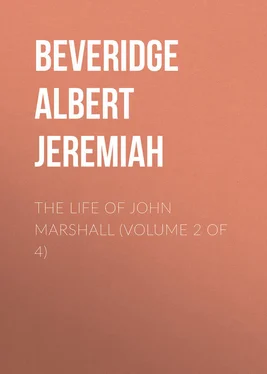Undoubtedly this gentleman was one of the perturbed Federalist managers.
North American Review , xxvi, 22. While this story seems improbable, no evidence has appeared which throws doubt upon it. At any rate, it serves to illustrate Marshall's astonishing popularity.
Carrington's reports to Washington were often absurd in their optimistic inaccuracy. They are typical of those which faithful office-holding politicians habitually make to the appointing power. For instance, Carrington told Washington in 1791 that, after traveling all over Virginia as United States Marshal and Collector of Internal Revenue, he was sure the people were content with Assumption and the whiskey tax (Washington's Diary : Lossing, footnote to 166), when, as a matter of fact, the State was boiling with opposition to those very measures.
The mingling, in the Republican mind, of the Jay Treaty, Neutrality, unfriendliness to France, and the Federalist Party is illustrated in a toast at a dinner in Lexington, Virginia, to Senator Brown, who had voted against the treaty: "The French Republic – May every power or party who would attempt to throw any obstacle in the way of its independence or happiness receive the reward due to corruption." ( Richmond and Manchester Advertiser , Oct. 15, 1795.)
Carrington to Washington, Nov. 10, 1795; MS., Lib. Cong.
Ib. , Nov. 13, 1795; MS.; Lib. Cong.
[381]The resolution "was warmly agitated three whole days." (Randolph to Jefferson, Nov. 22, 1795; Works : Ford, viii, footnote to 197.)
Carrington to Washington, Nov. 20, 1795; MS., Lib. Cong.
See debates; Annals , 4th Cong., 1st Sess., 423-1291; also see Petersburg Resolutions; American Remembrancer , i, 102-07.
Thompson's address, Aug. 1, 1795, at Petersburg; ib. , 21 et seq.
Carrington to Washington, Nov. 20, 1795; MS., Lib. Cong.
Randolph to Jefferson, Nov. 22, 1795; Works : Ford, viii, footnote to 197.
Randolph to Jefferson, Nov. 22, 1795; Works : Ford, viii, footnote to 197.
Ib.
Ib. See Hamilton's dissertation on the treaty-making power in numbers 36, 37, 38, of his "Camillus"; Works : Lodge, vi, 160-97.
Marshall to Hamilton, April 25, 1796; Works : Hamilton, vi, 109.
Randolph to Jefferson, Nov. 22, 1795; Works : Ford, viii, 198.
Journal, H.D. (Nov. 20, 1795), 27-28.
Journal, H.D. (Nov. 20, 1795), 28.
Carrington to Washington, Nov. 20, 1795; MS., Lib. Cong.
The italics are mine. "The word 'wisdom' in expressing the confidence of the House in the P.[resident] was so artfully introduced that if the fraudulent design had not been detected in time the vote of the House, as to its effect upon the P. would have been entirely done away… A resolution so worded as to acquit the P. of all evil intention, but at the same time silently censuring his error, was passed by a majority of 33." (Letter of Jefferson's son-in-law, enclosed by Jefferson to Madison; Works : Ford, viii, footnote to 198.)
Journal, H.D. (Nov. 21, 1795), 29.
Ib.
Journal, H.D. (Nov. 21, 1795), 29.
Jefferson to Madison, Nov. 26, 1795; Works : Ford, viii, 197-98.
Randall, ii, 36.
Journal, H.D. (1795), 72.
Journal, H.D. (1795), 50.
Ib. , 53.
Ib. , 79.
Ib. , 90.
Ib. , 91-92.
Carrington to Washington, Dec. 6, 1795; MS., Lib. Cong.
Journal, H.D. (Dec. 12, 1795), 91-92.
Carrington to Washington, Feb. 24, 1796; MS., Lib. Cong.
Dodd, 39.
Lee to Washington, July 7, 1796; Writings : Sparks, xi, 487.
Washington to Marshall, July 8, 1796; Washington MSS., Lib. Cong.
Marshall to Washington, July 11, 1796; ib.
Washington to Marshall, July 15, 1796; Washington's Private Letter Book; MS., Lib. Cong.
Washington to Marshall, Oct. 10, 1796; ib.
Marshall to Washington, Oct. 12, 1796; Washington MSS., Lib. Cong.
Genêt's successor as French Minister to the United States.
Interesting State Papers , 48 et seq.
Interesting State Papers , 55.
For able defense of Randolph see Conway, chap. xxiii; but contra , see Gibbs, i, chap. ix.
Patterson of New Jersey, Johnson of Maryland, C. C. Pinckney of South Carolina, Patrick Henry of Virginia, and Rufus King of New York. (Washington to Hamilton, Oct. 29, 1795; Writings : Ford, xiii, 129-30.) King declined because of the abuse heaped upon public officers. (Hamilton to Washington, Nov. 5, 1795; ib. , footnote to 130.)
Washington to Hamilton, Oct. 29, 1795; Writings : Ford, xiii, 131.
For debate see Annals , 4th Cong., 1st Sess., 423-1291.
Carrington to Washington, May 9, 1796; MS., Lib. Cong.
Oliver Wolcott to his father, Feb. 12, 1791; Gibbs, i, 62.
Hamilton to King, June 20, 1795; Works : Lodge, x, 103.
Washington to Knox, Sept. 20, 1795; Writings : Ford, xiii, 105-06.
Carrington to the President, April 22, 1796; Writings : Ford, xiii, footnote to 185.
Washington to Carrington, May 1, 1796; ib. , 185.
Ib. , 186.
Story, in Dillon, iii, 352.
Senator Stephen Thompson Mason wrote privately to Tazewell that the Fairfax purchasers and British merchants were the only friends of the treaty in Virginia. (Anderson, 42.)
Alexander Campbell. (See infra , chap. v.)
Randolph to Madison, Richmond, April 25, 1796; Conway, 362. Only freeholders could vote.
Marshall to Hamilton, April 25, 1796; Works : Hamilton, vi, 109.
Author unknown.
Читать дальше












